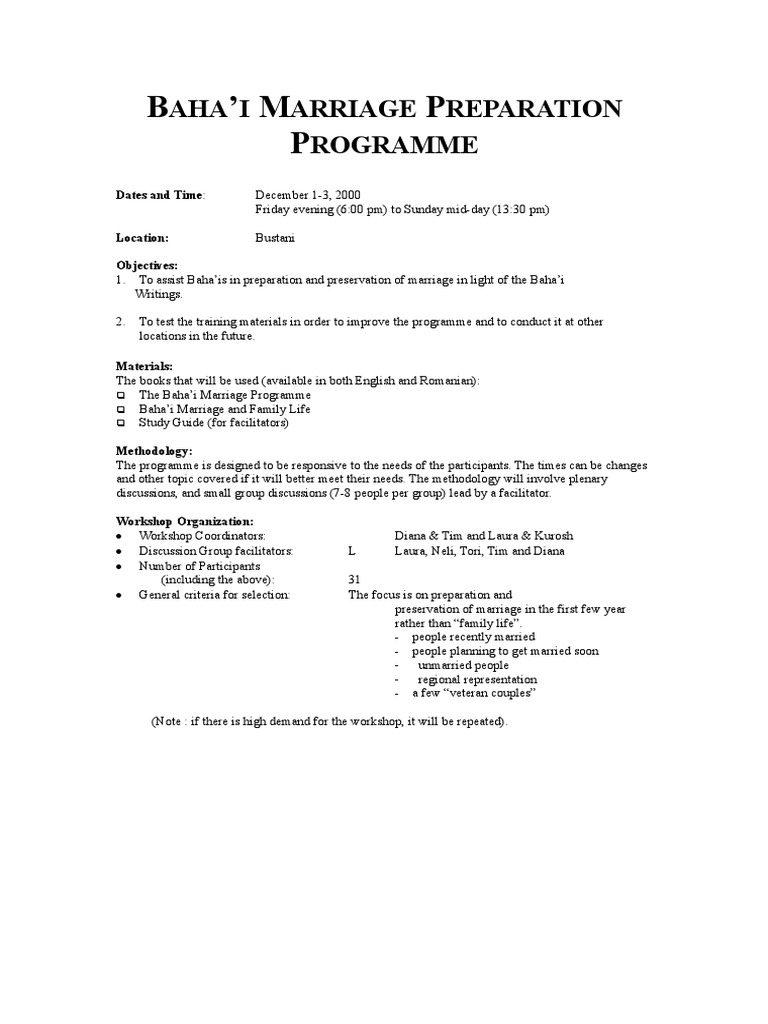Baha’i teachings present a unique paradigm for understanding marriage that transcends mere contractual arrangements, positing it as a divine institution imbued with profound spiritual significance. The Baha’i perspective on marriage hinges on several principal concepts that illuminate the nuances of marital relationships while promoting a holistic understanding of partnership. By delving into these teachings, one can uncover the intricate tapestry of beliefs that underpin Baha’i marital guidance, offering insights that resonate beyond the confines of traditional societal norms.
At the core of Baha’i marriage lies the fundamental tenet of love and unity. The teachings assert that true love is not simply a fleeting emotion but rather a state of being that fosters profound connection and mutual respect. This principle is encapsulated in the notion that marriage should not be viewed solely as a means of fulfilling personal desires but as a pathway to spiritual elevation and communal well-being. Partners are encouraged to cultivate an environment where love flourishes, enabling both individuals to progress along their spiritual journeys together.
Moreover, the Baha’i faith emphasizes the importance of equality in marriage. Central to this doctrine is the belief that men and women are equal in the sight of God. Hence, in a Baha’i marriage, both partners are seen as complementary forces. This duality enhances the richness of their relationship and allows for the reinforcement of both personal and collective strengths. Such an egalitarian framework rejects antiquated notions of dominance within marriage, advocating instead for shared responsibilities and decision-making processes.
An essential aspect of Baha’i marriage is the concept of ‘consultation’, which highlights the importance of dialogue and collaborative decision-making. This encourages partners to engage in open discussions regarding their aspirations, challenges, and values. Through heartfelt consultation, couples not only deepen their understanding of each other but also fortify their bond. The act of consulting instills a sense of unity that undergirds their marital commitment, ensuring that both partners feel valued and heard.
Transitioning from individual aspirations to shared goals is vital in a Baha’i marriage. The teachings underscore the pursuit of common purposes that transcend personal ambitions. Couples are urged to consider their marriage as a collaborative endeavor in which both partners unite their aspirations for the benefit of their family and the broader community. This spirit of collaboration fosters a sense of purpose that transcends the mundane aspects of daily life, allowing the couple to engage meaningfully with each other and their environment.
Baha’i teachings also elucidate profound spiritual dimensions of marriage, emphasizing the idea that the union of husband and wife is a reflection of the divine. This notion posits that through their commitment to one another, couples can manifest divine qualities such as patience, forgiveness, and compassion. This spiritual lens transforms the marital bond into a sacred covenant, promoting a sense of responsibility toward nurturing not only their relationship but also their individual spiritual growth. As spouses strive to embody these virtues, they enhance their capacity to contribute positively to a world in need of healing.
Furthermore, Baha’is are encouraged to approach marriage with an attitude of preparation. The concept of marriage preparation within the faith underscores the importance of self-reflection and spiritual readiness. Prospective couples are prompted to engage in deep discussions regarding their values, beliefs, and life goals, ensuring compatibility and alignment in their essential ideals. This preparatory phase is not merely an exercise in logistics but a profound exploration of the individuals’ readiness to enter a lifelong partnership.
Baha’i marriage guidance extends beyond the couple themselves, encompassing the wider community. The teachings advocate for the nurturing of a supportive social network, recognizing that strong marriages contribute significantly to societal harmony. Couples are encouraged to engage with their communities, fostering bonds that extend the impact of their union. This communal dimension exemplifies the belief that marriage is not merely a private affair, but a vital societal institution that can inspire collective action toward social betterment.
An intriguing facet of Baha’i marriage is the emphasis on lifelong growth. Partners are encouraged to view their relationship as an evolving journey that requires continuous effort and nurturing. This acknowledgement of change encourages couples to adapt and evolve together, recognizing that each individual will undergo personal transformations throughout their lives. A Baha’i marriage is thus characterized by an ongoing commitment to growth and development, celebrating the plurality of experiences that enrich the marital narrative.
In conclusion, a Baha’i marriage is a multifaceted institution that intertwines love, equality, communication, spiritual elevation, preparation, and communal engagement. Through its emphasis on these core principles, Baha’i teachings invite individuals to reimagine the essence of partnership, transforming marriage from a contractual obligation to a sacred collaboration. The insights gleaned from this perspective can illuminate paths to richer, more fulfilling relationships based on shared ideals and aspirations. By embracing the myriad of dimensions offered within Baha’i teachings, one can foster a transformative approach to marriage that promises not only personal and spiritual growth but also contributions to the betterment of society.
